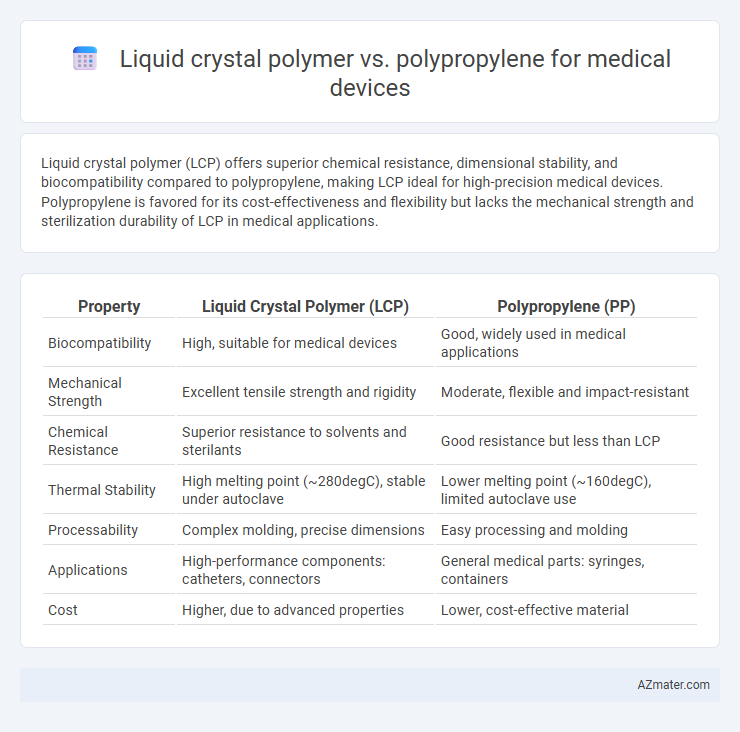Liquid crystal polymer (LCP) offers superior chemical resistance, dimensional stability, and biocompatibility compared to polypropylene, making LCP ideal for high-precision medical devices. Polypropylene is favored for its cost-effectiveness and flexibility but lacks the mechanical strength and sterilization durability of LCP in medical applications.
Table of Comparison
| Property | Liquid Crystal Polymer (LCP) | Polypropylene (PP) |
|---|---|---|
| Biocompatibility | High, suitable for medical devices | Good, widely used in medical applications |
| Mechanical Strength | Excellent tensile strength and rigidity | Moderate, flexible and impact-resistant |
| Chemical Resistance | Superior resistance to solvents and sterilants | Good resistance but less than LCP |
| Thermal Stability | High melting point (~280degC), stable under autoclave | Lower melting point (~160degC), limited autoclave use |
| Processability | Complex molding, precise dimensions | Easy processing and molding |
| Applications | High-performance components: catheters, connectors | General medical parts: syringes, containers |
| Cost | Higher, due to advanced properties | Lower, cost-effective material |
Introduction to Liquid Crystal Polymer and Polypropylene
Liquid crystal polymer (LCP) exhibits exceptional chemical resistance, dimensional stability, and biocompatibility, making it ideal for precise medical device components requiring robust performance in sterilization processes. Polypropylene (PP) offers excellent chemical resistance, low cost, and flexibility, commonly used in disposable medical applications such as syringes and containers due to its lightweight nature and ease of molding. Both materials support medical-grade certifications, but LCP outperforms PP in high-temperature environments and mechanical strength essential for complex device parts.
Material Properties Comparison
Liquid crystal polymer (LCP) offers superior chemical resistance, high tensile strength, and excellent thermal stability, making it ideal for sterilization processes in medical devices. Polypropylene (PP) provides good flexibility, lower cost, and outstanding biocompatibility but has lower heat resistance and mechanical strength compared to LCP. The dimensional stability and low moisture absorption of LCP make it preferable for precision components, while polypropylene's ease of molding suits disposable medical applications.
Mechanical Strength and Durability
Liquid crystal polymer (LCP) exhibits superior mechanical strength and durability compared to polypropylene, making it highly suitable for medical device applications that demand high tensile strength and resistance to wear. LCP's inherent thermal stability and chemical resistance ensure long-term performance under sterilization processes, whereas polypropylene may degrade or deform under similar conditions. The high modulus and dimensional stability of LCP contribute to its advantage in precision medical components exposed to repetitive mechanical stress.
Chemical and Sterilization Resistance
Liquid crystal polymer (LCP) exhibits superior chemical resistance compared to polypropylene (PP), making it highly suitable for medical devices exposed to harsh chemicals and solvents. LCP also withstands multiple sterilization methods, including autoclaving, gamma radiation, and ethylene oxide, without significant degradation, whereas polypropylene can degrade or lose mechanical integrity under repeated or high-temperature sterilization. The enhanced chemical and sterilization resistance of LCP ensures extended device durability and reliability in demanding medical environments.
Biocompatibility in Medical Applications
Liquid crystal polymer (LCP) exhibits superior biocompatibility compared to polypropylene (PP) in medical device applications due to its inherent chemical resistance, low moisture absorption, and excellent dimensional stability. LCP demonstrates minimal cytotoxicity and reduced inflammatory response, making it ideal for implantable and long-term contact devices, whereas polypropylene's higher susceptibility to degradation and biofilm formation can compromise device safety. The enhanced sterilization tolerance of LCP, including resistance to autoclave and gamma radiation, further supports its preference in critical medical environments.
Processability and Manufacturing Methods
Liquid crystal polymer (LCP) offers superior processability for medical devices with its high thermal stability and excellent dimensional accuracy, enabling precision molding and complex geometries that polypropylene (PP) often struggles to achieve. Polypropylene is favored for its ease of processing through traditional manufacturing methods like injection molding and extrusion, providing cost-effective production but with limitations in mechanical strength and chemical resistance compared to LCP. Manufacturing medical devices with LCP typically requires advanced techniques such as injection molding with precise temperature control, while polypropylene supports faster cycle times and greater flexibility in large-scale manufacturing.
Cost Efficiency and Availability
Liquid crystal polymer (LCP) offers superior mechanical properties and chemical resistance for demanding medical device applications but comes at a higher cost compared to polypropylene (PP). Polypropylene is widely available, cost-effective, and suitable for disposable medical components, making it the preferred choice for large-volume production. The balance between LCP's durability and PP's affordability impacts material selection based on device complexity and budget constraints.
Regulatory Compliance and Certifications
Liquid crystal polymer (LCP) and polypropylene (PP) for medical devices differ significantly in regulatory compliance and certifications. LCP often meets stringent FDA and ISO 10993 biocompatibility standards due to its chemical resistance and stability, making it suitable for implantable devices and sterilization processes like gamma and ethylene oxide. Polypropylene typically conforms to FDA 21 CFR 177.1520 and USP Class VI standards, commonly used for disposable and non-implantable devices requiring steam sterilization, but may have limitations in high-temperature or chemical exposure scenarios.
Application Examples in Medical Devices
Liquid crystal polymer (LCP) is widely utilized in medical devices requiring high dimensional stability, chemical resistance, and sterilization tolerance, such as catheters, surgical instruments, and implantable device housings. Polypropylene (PP) finds application in disposable medical products like syringes, specimen cups, and medical packaging due to its excellent chemical resistance, flexibility, and cost-effectiveness. LCP's superior mechanical strength and biocompatibility make it ideal for precision components in minimally invasive surgery tools, while PP's lightweight and processability benefit single-use medical items.
Future Trends in Medical Polymer Selection
Liquid crystal polymers (LCPs) are gaining prominence in medical device manufacturing due to their exceptional chemical resistance, mechanical strength, and precision molding capabilities compared to polypropylene (PP). Future trends emphasize the integration of biocompatible, sterilizable polymers like LCPs that support miniaturization and complex geometries essential for advanced medical applications. The shift towards durable, high-performance materials with enhanced thermal stability signals a growing preference for LCPs over traditional polypropylene in next-generation medical devices.

Infographic: Liquid crystal polymer vs Polypropylene for Medical device
 azmater.com
azmater.com